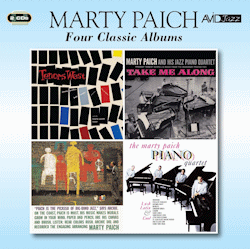CD1
Tenors West
1. Tenors West
2. There's No You
3. The Dragon
4. Shorty George
5. Paichence
6. At The Mardi Gras
7. Take The "A" Train
8. Ballet Du Bongo
9. Line For Lyons
10. Jacqueline
11. Con-Spirito
Take Me Along
12. Overture-Take Me Along
13. Nine O'Clock
14. Little Green Snake
15. Promise Me A Rose
16. But Yours
17. Sid, Ol' Kid
18. Patience Of A Saint
19. Staying Young
20. Thinkin' Things
21. We're Home
CD2
The Picasso of Big Band Jazz
1. From Now On
2. Walkin' On Home
3. Black Rose
4. Tommy's Toon
5. New Soft Shoe
6. What's New
7. Easy Listnin'
8. Martyni Time
9. Nice And Easy
Lush, Latin and Cool
10. Honky Tonk Train
11. Invitation
12. Autumn Leaves
13. Honeysuckle Rose
14. Stella By Starlight
15. Cumana
16. Sabre Dance
17. Canadian Sunset
18. St. Louis Blues Boogie Woogie
19. Little Rock Getaway
20. Miserlou
21. One O'Clock Jump
Marty Paich Octet; Marty Paich and His Jazz Piano Quartet: The Marty Paich Piano Quartet
Recorded 1955-60 [79:23 + 75:29]
The punchy swing of Marty Paich’s 1955 Octet inaugurates the first of the four LPs decanted into Avid’s twofer. Smooth voicings ensure that West Coast
niceties are upheld and with blues-encoded work from Conte Candoli and a sax section dripping with talent – Giuffre, Bob Cooper, Bob Enevoldsen, Harry Klee
and Jack Dulong – these eleven tracks lack for little in either sophistication or vitality. Basie-ish musings infiltrate Shorty George, hardly
surprising as it’s a Count co-composition, and Paich’s own modish fun on Ballet Du Bongo (where his piano sounds rather reminiscent of Nat Pierce)
extends the stylistic variety on offer. It’s by far the longest track. Playful Classicism can be savoured on Con-Spirito, another Paich original,
where the solos, if somewhat too tidy, are nevertheless eloquent. Paich, let it not be forgotten, took composition lessons from Castelnuovo-Tedesco.
The Paich Jazz Piano Quartet is a jazz concept based on Bob Merrill’s music for the show Take Me Along. The fellow ivory ticklers are Pete Jolly,
Jimmy Rowles and Johnny Williams. Vic Feldman is less audible on vibes, though he has his moment amidst the geniality of Patience of a Saint.
Despite the ‘jazz concept’ there’s no improvisation here, and this will be of significantly less interest to out-and-out aficionados. Paich’s Big Band,
with a raft of West Coast denizens, produced nine excellent cuts on the Picasso of Big Band Jazz album made in California in June 1957. I suspect
that the idea of Picasso the Jazzman was old hat even then, though it’s a decent enough peg on which to hang these moody, cleverly textured peaches all of
which, with the exception of the Burke-Haggart What’s New are from Paich’s busy pen. The crisp, cool voicings – French horn, clarinet amongst them
- generate plenty of colour and finesse. Rhythms are easy swinging, sometimes indeed loping and there’s nothing anaemic about this date, though its heat is
of the under-floor rather than wall mounted kind; implied rather than boiling. The last album sees a return of the Piano Quartet this time accompanied by
the Usual Suspects – including Art Pepper and Bud Shank – amongst brass and reeds. A very elevated string quartet is part of the ensemble as well. Plenty
of genres are covered, from Chi-Chi to Boogie, festive Latino to mood music, lush strings to piano roulades, a knees-up Little Rock Getaway to a
glittering but exciting One O’Clock Jump. Not subtle, no, but enjoyable.
Paich admirers will know that the jazz content of the two Piano Quartet albums is low and that Tenors West and Picasso are the main focus
of interest here. Booklet reproduction is excellent and the transfers are good.
Jonathan Woolf
